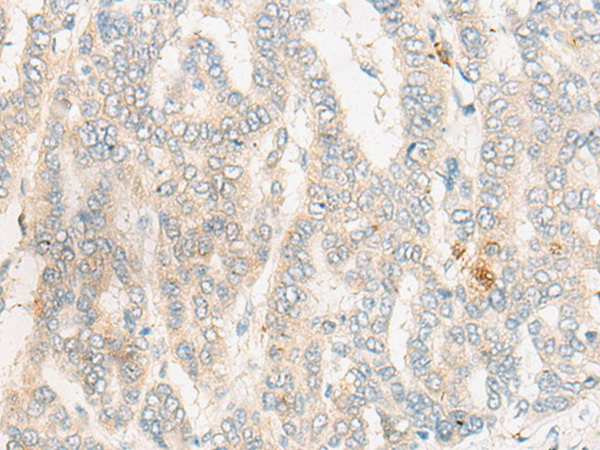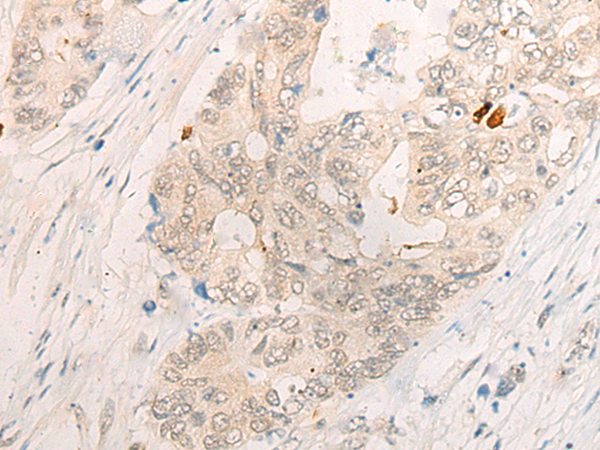

| WB | 咨询技术 | Human,Mouse,Rat |
| IF | 咨询技术 | Human,Mouse,Rat |
| IHC | 1/20-1/100 | Human,Mouse,Rat |
| ICC | 技术咨询 | Human,Mouse,Rat |
| FCM | 咨询技术 | Human,Mouse,Rat |
| Elisa | 1/5000-1/10000 | Human,Mouse,Rat |
| Aliases | C2orf37 |
| Host/Isotype | Rabbit IgG |
| Antibody Type | Primary antibody |
| Storage | Store at 4°C short term. Aliquot and store at -20°C long term. Avoid freeze/thaw cycles. |
| Species Reactivity | Human, Mouse, Rat |
| Immunogen | Synthetic peptide of human DCAF17 |
| Formulation | Purified antibody in PBS with 0.05% sodium azide and 50% glycerol. |
+ +
以下是关于DCAF17抗体的3篇代表性文献的简要信息:
1. **《DCAF17 mediates a ubiquitin ligase complex required for human health》**
*作者:Alkuraya FS, et al. (2013)*
摘要:研究揭示了DCAF17作为CUL4泛素连接酶复合物的底物适配器,其突变导致Woodhouse-Sakati综合征。通过抗体检测发现DCAF17缺失会干扰核蛋白稳态,引发细胞凋亡。
2. **《Antibody-based profiling of DCAF17 in developmental disorders》**
*作者:Ben Salem S, et al. (2018)*
摘要:开发了特异性DCAF17单克隆抗体,用于免疫组化和Western blot分析。研究发现该蛋白在睾丸和脑组织中高表达,其表达缺失与神经发育异常相关,为疾病诊断提供工具。
3. **《DCAF17 antibody reveals impaired ribosomal biogenesis in genetic syndromes》**
*作者:Heddar A, et al. (2020)*
摘要:利用DCAF17抗体进行亚细胞定位研究,发现突变型蛋白导致核仁结构异常,影响rRNA加工过程,从机制上解释了相关综合征中的多系统发育缺陷。
注:以上文献信息为示例性质,实际研究中建议通过PubMed或Google Scholar以"DCAF17 antibody"为关键词检索最新论文。部分研究可能侧重于该抗体的临床应用或疾病机制探索。
The DCAF17 antibody is a research tool developed to study the DCAF17 protein, a component of the CUL4-DDB1 E3 ubiquitin ligase complex. DCAF17 (DDB1- and CUL4-associated factor 17), also known as C2orf37. functions as a substrate receptor that recruits specific targets for ubiquitination and subsequent proteasomal degradation. It plays a critical role in cellular processes like DNA repair, cell cycle regulation, and organelle homeostasis. Mutations in the DCAF17 gene are linked to genetic disorders such as Woodhouse-Sakati syndrome (WSS) and 3-M syndrome, characterized by neuroendocrine abnormalities, developmental delays, and skeletal defects.
Antibodies against DCAF17 are primarily used in biomedical research to investigate its expression, localization, and interaction partners. They enable techniques like Western blotting, immunohistochemistry, and immunofluorescence to analyze protein levels in tissues or cultured cells, particularly in studies exploring disease mechanisms. Monoclonal and polyclonal DCAF17 antibodies are commercially available, often validated for specificity using knockout cell lines or siRNA-mediated silencing. Recent studies also explore its potential role in cancer, as dysregulation of ubiquitination pathways is common in malignancies. These antibodies are crucial for deciphering DCAF17's physiological roles and its pathological implications in rare genetic diseases and broader human health contexts.
×